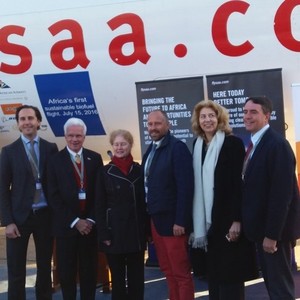1st sustainable flight in Africa fueled by tobacco-based biojet

Photo: The Roundtable on Sustainable Biomaterials
July 15, 2016
BY The Roundtable on Sustainable Biomaterials
On Boeing’s 100th anniversary, South African Airways celebrated Africa’s first sustainable biofuel flight. The flight from Johannesburg to Cape Town, operated by a Boeing 737-800, used biojet fuel produced from Sunchem’s nicotine-free tobacco plant Solaris, refined by AltAir Fuels, and supplied by SkyNRG. Sunchem and SkyNRG are both RSB-certified, and AltAir is in the process of RSB certification.
This flight and project serves as inspiration for others around the world that it is possible to produce environmentally sustainable and socially responsible biofuel that improves lives of many smallholder farmers and helps with job salvation and poverty alleviation. Project Solaris in the Limpopo region is a great example of working in partnership with others to bring workable solutions to South Africa. With Boeing’s support, RSB and WWF-SA are working in this project to ensure smallholders can compete with commercial farming operations in supplying feedstock to biofuel producers.
RSB hopes these positive impacts can be duplicated around the world in various regions with diverse feedstocks, and that there will be more flights like this one so that aviation can become more sustainable and reduce its impact on GHG emissions.
Advertisement
RSB is also humbled and honored to be in South Africa celebrating Nelson Mandela’s birthday coming up July 18. The Nelson Mandela Foundation continues his very important work on combating poverty and improving human rights, which aligns with RSB’s Principle 4 on human and labor rights and Principle 5 on rural and social development.
Background
Advertisement
In South Africa, RSB partnered with Sunchem SA and SkyNRG, which developed the novel energy tobacco crop Solaris, a traditionally cross-bred variety of tobacco that contains no nicotine, has high seed and limited leaf production compared to traditional tobacco. These normally undesirable traits make Solaris an ideal feedstock for biofuel production.
The crop is cultivated by smallholder and commercial farmers in the Limpopo province of South Africa. Solaris is an exciting crop because it provides an opportunity to grow sustainable bioenergy resources, while stimulating socioeconomic development in South Africa.
RSB continues to work with Boeing, WWF-SA and others on this project to help safeguard natural resources, water and food for growing populations. WWF-SA is working with RSB to ensure the environmental and social credentials of emerging biofuel value chains are adequate and trustworthy as RSB is recognized as incorporating the highest sustainability demands for such projects.
The project was launched in Marble Hall in May 2014, with Solaris now scaled-up in South Africa as a locally produced feedstock for sustainable biojet fuel production.
Related Stories
Bangkok Airways Public Company Limited has officially announced the adoption of sustainable aviation fuel (SAF) on its commercial flights, reinforcing Thailand’s green aviation industry. The initiative took effect starting July 1, 2025.
The USDA significantly increased its estimate for 2025-’26 soybean oil use in biofuel production in its latest World Agricultural Supply and Demand Estimates report, released July 11. The outlook for soybean production was revised down.
U.S. fuel ethanol capacity fell slightly in April, while biodiesel and renewable diesel capacity held steady, according to data released by the U.S. EIA on June 30. Feedstock consumption was down when compared to the previous month.
The U.S. EPA on July 8 hosted virtual public hearing to gather input on the agency’s recently released proposed rule to set 2026 and 2027 RFS RVOs. Members of the biofuel industry were among those to offer testimony during the event.
The USDA’s Risk Management Agency is implementing multiple changes to the Camelina pilot insurance program for the 2026 and succeeding crop years. The changes will expand coverage options and provide greater flexibility for producers.
Upcoming Events










